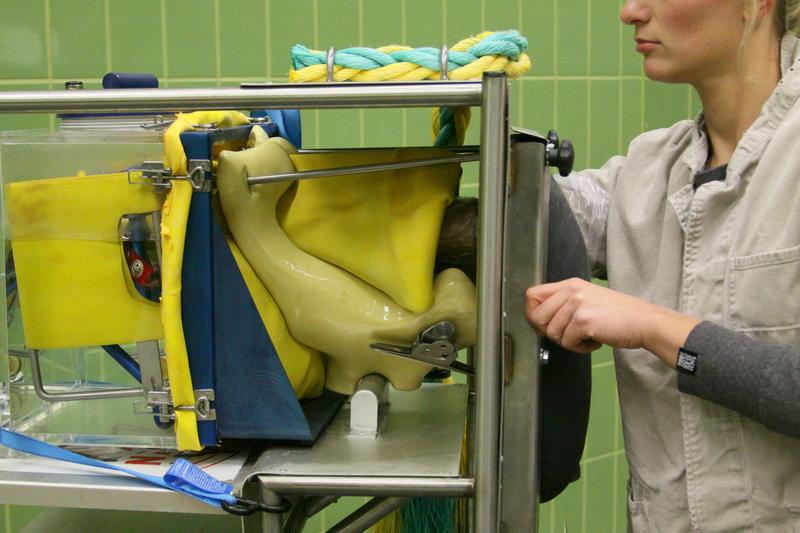

On the horse simulator students can exercise gynaecological examinations.
(Photo: Christina Nagel/Vetmeduni Vienna)
Simulator-based training of students at Vetmeduni Vienna has been part of the curriculum since 2012. The Skills Lab is a simulated veterinary practice in which students have the chance to train a variety of veterinary interventions in a near-realistic setup on animal dummies.
But is simulator-based training really as efficient as training on live animals? Christina Nagel, Christine Aurich and their team from Vetmeduni Vienna’s Centre for Artificial Insemination and Embryo Transfer have now analysed for the first time the efficiency of simulator-based training in large animal gynaecology.
Twenty-five third-year veterinary students participated in the study on gynaecological examination of horse mares. Students were randomly allocated to three groups and taught palpation and ultrasonography of the equine genital tract in different ways. Group 1 trained four times on the simulator, consisting of a plastic box shaped like the back-end of a horse with exchangeable rubber genital organs. Group 2 students were trained four times on teaching horses whereas group 3 had only one training session on horse mares.
Simulator-based training is nearly as efficient as animal-based training
Two weeks after the last training session, the researchers tested the learning outcomes. All students were asked to examine a horse mare and to make a diagnosis. Students who had trained four times on horses scored best with regard to a correct diagnosis. Students who had been trained only once on horses had the worst results and those trained solely on the simulator scored in between the two other groups. With regard to ultrasonography of the genital tract, there were no major differences between groups.
“Simulator-based training prepares the students very efficiently for diagnostic procedures on live horses,” explains Christina Nagel, principal investigator of the study. “Simulators are, however, not only an additional teaching tool for our students but also a contribution to animal welfare. Only when students have successfully finished the simulator-based training course are they allowed to perform the same diagnostic procedures in animals.”
Competent animal handling
The stress perceived by horses during gynaecological examinations had already been studied in 2007 by Christine Aurich and her team. Now she was interested in how students feel when examining a horse compared to examining the teaching simulator. Students with previous training on the simulator were less stressed when finally exposed to a live horse. This conclusion is based on recordings of the students’ heart rate and salivary cortisol concentration during the training sessions and tests. The results were published recently in the scientific journal Reproduction in Domestic Animals.
“The results from these studies encourage us to increase the use of teaching simulators for the training of future veterinarians. Repeated training is the best way to improve the students’ diagnostic skills. Our students gain confidence and clinical routine and are thus well-prepared when confronted with clinical cases in the animal hospital. And well-trained veterinary students are also a contribution to animal welfare,” stated Christine Aurich.
The studies on simulator-based training in equine gynaecology were supported by the KELDAT programme of veterinary teaching establishments in Austria, Germany and Switzerland. http://www.tiho-hannover.de/studium-lehre/keldat-kompetenzzentrum/
Service:
The article “Teaching of diagnostic skills in equine gynecology: Simulator-based training versus schooling on live horses” by Christina Nagel, Natascha Ille, Jörg Aurich and Christine Aurich was published in the journal Theriogenology. doi:10.1016/j.theriogenology.2015.06.007
http://www.sciencedirect.com/science/article/pii/S0093691X1500312X
The article “Stress Response of Veterinary Students to Gynaecological Examination of Horse Mares – Effects of Simulator-Based and Animal-Based Training” by Christina Nagel, Natascha Ille, Regina Erber, Christine Aurich and Jörg Aurich was published in the journal Reproduction in Domestic Animals. doi: 10.1111/rda.12600
http://www.ncbi.nlm.nih.gov/pubmed/26310966
Photos: http://www.vu-wien.ac.at/vetmediathek/Webgalerien/vrl/index.html#
About the University of Veterinary Medicine, Vienna
The University of Veterinary Medicine, Vienna in Austria is one of the leading academic and research institutions in the field of Veterinary Sciences in Europe. About 1,300 employees and 2,300 students work on the campus in the north of Vienna which also houses five university clinics and various research sites. Outside of Vienna the university operates Teaching and Research Farms. http://www.vetmeduni.ac.at
Scientific Contact:
Prof. Jörg Aurich
Clinical Unit of Obstetrics, Gynaecology and Andrology
University of Veterinary Medicine Vienna (Vetmeduni Vienna)
T +43 1 25077-5400
joerg.aurich@vetmeduni.ac.at
or
Dr. Christina Nagel
Insemination and Embryotransfer Platform
T +43 1 25077-6408
christina.nagel@vetmeduni.ac.at
Released by:
Susanna Berger
Science Communication / Corporate Communications
University of Veterinary Medicine Vienna (Vetmeduni Vienna)
T +43 1 25077-1153
susanna.berger@vetmeduni.ac.at
http://www.vetmeduni.ac.at/en/infoservice/presseinformation/presseinformationen-…












